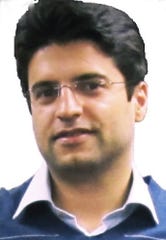“Catastrophic.”
 That’s the word a “senior company official” used to describe the potential fallout from an Iranian-American researcher at the University of Michigan who stole confidential files about a secret aerospace supercomputer and sent them to his brother in Iran, where the brother works on nuclear missiles, according to the FBI.
That’s the word a “senior company official” used to describe the potential fallout from an Iranian-American researcher at the University of Michigan who stole confidential files about a secret aerospace supercomputer and sent them to his brother in Iran, where the brother works on nuclear missiles, according to the FBI.
Federal agents arrested Ypsilanti engineer and UM employee Amin Hasanzadeh late last month on charges of interstate transportation of stolen property, fraud and misuse of visas, permits or other documents – the former for sending trade secrets to Iran, and the latter for lying about serving in the Iranian military.
Hasandzadeh appeared last week for a bond hearing in Detroit, where a judge denied a request for bail pending trial.
The Detroit News reports:
He is charged with stealing technical data from an unidentified company in Metro Detroit and sending it to his brother, who is linked to Iran’s nuclear weapons industry.
Hasanzadeh, an Iranian military veteran, was allegedly involved in a yearlong plan to steal confidential data about a secret project involving an aerospace industry supercomputer, according to a criminal complaint unsealed Wednesday.
The 42-year-old, a lawful permanent resident in the U.S., allegedly started sending trade secrets and important files on the company’s top projects to his brother less than a week after starting with the company.
“Hasanzadeh concealed the communications from the company by almost exclusively using a personal email account to transfer documents to his brother on a regular basis until approximately June 11, 2016,” MLive reports. “Documents included hundreds of the company’s layouts, projects, schematics, notes and zip files without the company’s knowledge or consent, the federal government alleges.
“The company reviewed and confirmed the documents contained product performance specifications, confidential information, including an attachment marked ‘Confidential’ with information belonging to a United States partner company and another marked ‘NDA Confidential,’ meaning it involved a non-disclosure agreement with a partner company.”
An FBI counterintelligence agent wrote in Hasanzadeh’s arrest affidavit: “A senior company official advised that any unauthorized disclosure or theft of partner company documents and information protected under an NDA could be ‘catastrophic,’” The Jerusalem Post reports.
The complaint states FBI officials confirmed the email account that received the information was established by Hasanzadeh’s brother, Sina Hassanzadeh, in 2008. Agents also confirmed he was logging in to the account from Iranian Internet Protocol addresses over the last decade, MLive reports.
“According to the complaint, Sina Hasanzadeh had expertise in hardware engineering and experience programming code with the Iranian company Kavosh Sameneh Ayria, as well as Basamad Azma Company from 2009-10 – an entity affiliated with Iran’s cruise missile research,” the news site reports.
“He also was employed in Iran by multiple other companies, identified as Moj Pardaz, Bashir, and Ryan Nik, between 2013 and 2018, where he had job responsibilities indicative of military programs.”
The FBI allege Hasanzadeh also sent copies of some of the documents to his wife, who was in the doctoral program at the UM’s Electrical Engineering Department at the time.
In March 2019, the College of Engineering hired Hasanzadeh.
Later, “the FBI’s investigation revealed the university email account provided to Hasanzadeh’s wife contained thousands of company documents in her cloud storage associated with the account,” MLive reports.
Despite the obvious implications – underscored by Iran’s recent efforts to ramp up its nuclear weapons programs – FBI officials are assuring Americans all is well.
“We don’t have any concerns that there is a current threat to the safety of the United States,” FBI Special Agent Mara Schneider told The Detroit News.
UM officials, meanwhile, don’t have much to say.
“The university has fully cooperated with the FBI during its investigation,” spokesman Rick Fitzgerald said.
Leave a Comment
COMMENTS POLICY: We have no tolerance for messages of violence, racism, vulgarity, obscenity or other such discourteous behavior. Thank you for contributing to a respectful and useful online dialogue.